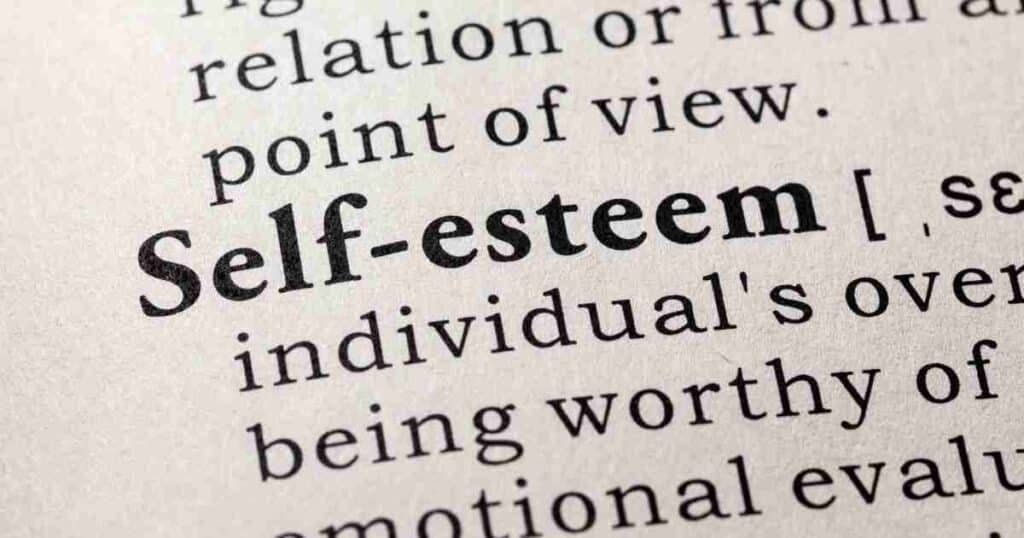In a society that frequently emphasizes humility and modesty, the idea of start thinking highly of yourself might seem unconventional.
However, it’s time to reevaluate this perspective. This isn’t about arrogance or self-centeredness.
Instead, it’s about recognizing your inherent value, acknowledging your strengths, and nurturing a positive self-image.
Join me in investigating the evolving path to increase confidence, resilience, and contentment.
No fluff, no redundancy—just a genuine conversation about achieving your potential.
Recognizing Your Inherent Worth

Ever felt like you’re on autopilot, constantly meeting external expectations?
I have a revelation to share with you: your worth is not dependent on any conditions.
Acknowledge and value your inherent worth. It’s a shift in mindset; understand that your quality is a fundamental aspect of who you are, independent of external validation. This intrinsic trait is the basis for self-assurance. Imagine the possibilities if you believe in yourself.
Appreciating Your Uniqueness: Breaking Free From the Comparison Trap
We often measure our worth based on others’ achievements and lifestyles.
Comparing robs us of our joy. What if you stopped competing with others and embraced your uniqueness?
Can you imagine the freedom that comes with appreciating your journey and how it contributes to the rich fabric of life’s experiences?
Many people struggle with realizing their merit and observing their strengths.

We often focus on weaknesses rather than acknowledging our unique abilities.
You need to start thinking highly of yourself by appreciating your merits.
Your journey and means to success are distinct. Everyone is unique in strengths, talents, and experiences. Comparing yourselves to others diminishes your worth.
Cherish and embody what sets you apart, take the time to discover what makes you special, and leverage those features in every aspect of your life.
Self-acceptance is significant in breaking free from the comparison trap. Live an abundant life based on our ethics, objectives, and real selves.
Escaping Self-Doubt: Identifying Limiting Beliefs

Self-doubt, the nagging uncertainty in one’s abilities or worth, commonly arises from experiences, external criticism, or societal pressures. It silently sabotages and hinders your growth.
To start thinking highly of yourself, confront these doubts head-on.
As self-doubt takes root, it provides fertile ground for limiting beliefs to flourish.
These self-sabotaging beliefs prevent us from pursuing aspirations and facing challenges.
One of the key challenges in overcoming limiting beliefs lies in recognizing their presence and influence.
These beliefs subtly influence our decisions and perceptions. Bringing them to the forefront is vital.
Identifying Limiting Beliefs
The initial step to conquering limiting beliefs is to become more aware of them.
Watch for negative self-talk in various situations. Identify repetitive thoughts that undermine your confidence and self-worth.
Notice the situations or triggers that activate these beliefs.
What circumstances consistently make you feel inadequate or doubtful? Knowing triggers helps you anticipate and prepare for challenges.
Questioning the Validity of Limiting Beliefs

Once you have identified your limiting beliefs, question their validity.
Address the assumptions and fears that drive these negative thoughts.
Consider if there is evidence to support these beliefs or if they are based on generalizations or irrelevant past experiences.
Explore Different Sides
Look for positive affirmations and counterarguments to challenge negative self-talk. Connect with supportive individuals for objective and encouraging perspectives.
Have a supportive inner dialogue that allows self-acceptance.
Questioning limiting beliefs can free you from their hold and improve your self-image.
Importance of Self-Esteem

Envision a realm where you have unwavering confidence, where self-doubt is a distant memory, and where your self-worth is unshakeable. Despite seeming unattainable, developing a favorable self-identity is within your reach.
Self-esteem, the cornerstone of personal growth and happiness, is the foundation upon which you build your life. It dictates your relationships, your career trajectory, and your overall well-being.
Still, a lot of people grapple with low self-esteem, which hampers their potential and dims their inner glow.
Let’s examine how self-esteem influences various aspects of our lives.
Mental Health and Emotional Well-being
High self-esteem is linked to lower levels of anxiety, depression, and stress. High self-esteem enhances resilience, enabling individuals to overcome obstacles.
Conversely, low self-esteem can contribute to a heightened susceptibility to mental health issues.
Low self-esteem can lead to feelings of inadequacy, worthlessness, and self-doubt, making individuals more vulnerable to anxiety, depression, and stress.
Relationships and Social Interactions
Self-esteem significantly influences our relationships and social interactions.
High self-esteem attracts healthier relationships and fosters inspirational communication, empathy, and trust in their relationships.
Low self-esteem can limit assertiveness, communication, and relationships.
Career Success and Professional Achievements
Self-esteem is important for career success and professional achievements.
People with high self-esteem are more likely to aim for ambitious goals, pursue them with determination, and persist despite obstacles.
They exude confidence, impressing employers and colleagues.
In contrast, low self-esteem restricts career growth and professional opportunities.
People with poor self-esteem may avoid new challenges.
Setting Realistic Goals
Goal-setting is not just a productivity buzzword. What if your goals were achievable steps instead of intimidating mountains? These steps create a roadmap for success.
How would it feel to conquer each milestone, gradually sculpting a version of yourself that you can be proud of?
Your self-esteem will naturally increase, reinforcing your capabilities for greatness.
Self-Discipline: The Power of Self-Control
Self-discipline is a knack for regulating one’s thoughts, feelings, and behavior to achieve a desired goal.

It requires clear intentions, consistent choices, and impulse control for long-term objectives.
Establishing Clear Intentions
Self-discipline starts with clear intentions and aligned actions.
Identify your objectives and their significance.
A strong sense of purpose motivates and guides your efforts.
Developing Consistent Habits
Self-discipline is not about temporary willpower bursts.
Create routines and practices that match your intentions.
These habits settle in with time, making self-discipline easier and making self-discipline effortless.
Practicing Mindfulness and Self-Awareness
Pay attention to your thoughts, emotions, and triggers. Identify and resist temptations that impede your progress. This awareness helps you choose carefully rather than abruptly.
Mindfulness is an effective tool for emotional regulation. You learn to handle emotions calmly and choose constructive behaviors instead of reacting impulsively.
Self-discipline demands continuous effort and self-reflection.
Managing Distractions and Temptations
Distractions and temptations are inevitable.
Devise strategies to manage them effectively.
Pinpoint your most common distractions and mitigate their impact.
Reflect on the possible outcomes of succumbing to temptations versus succeeding in your ambitions.
Learning from Setbacks
Setbacks are a part of every journey. Instead of roadblocks, setbacks can be detours to new opportunities.
Picture every stumble being a lesson, not a failure.

Look at what went wrong, learn from it, and apply it to future projects. Your strength and capability are incredible, so start thinking highly of yourself.
Examine what went wrong, learn from it, and apply it to future programs.
Admire Positive Self-Talk
Words are magical—they shape our world.
How about a change? Stop judging yourself and start loving yourself.
Every word you speak could shift your mindset.
Can you fathom the endless possibilities?
Master Your Fears: Start Thinking Highly of Yourself
Feeling overwhelmed by a situation? Preparing for the worst-case scenario through intentional imagination can lower anxiety levels, increase self-reliance, and enhance problem-solving and decision-making abilities.
Your reaction is what matters, not what happens to you. Be brave, conquer your fears, and continue with strength and confidence.
Cultivating a Growth Mindset
The underlying concept is that Perseverance and hard work enhance qualities. With a growth mindset, the desire for continuous learning comes naturally, whether through formal education or self-directed exploration.
The emphasis moves from perfection to progress.
In its essence, the development of a growth mindset is about preparing individuals to overcome challenges and setbacks and pursue continuous learning, establishing the foundation for lifelong growth and success.
Rewarding Progress and Celebrating Achievements

Building confidence is a long-term endeavor. Take a brief pause for celebration for every triumph, be it small.
It’s not about showing off; it’s a reminder of how far you have come.
Rewards bolster uplifting behavior and sustain motivation towards our objectives. Opt for rewards that carry personal significance and are in harmony with your values.
We assert our competencies and strengthen our optimistic self-view.
Seeking Feedback for Growth
Constructive input accelerates personal development.
Don’t fear criticism; actively seek feedback. Refer to it as an updated plan.
Feedback is a catalyst for growth and self-belief in your strengths.
Expressing Gratitude
Gratitude is a big deal.
It’s really tough to think badly about something when you’re grateful for it.
Therefore, prioritize highlighting the bright elements in your life.
It’ll make you feel better emotionally.
People also like:
Is Confidence an Emotion: The Surprising Truth
When and Why Sometimes you have to remove yourself: Strategic Self-Removal
Instilling Self-Compassion: Embracing Kindness towards Yourself
Self-compassion, the practice of treating oneself with kindness and understanding, plays a critical role in building high self-esteem.
Adopting Imperfections
Practice self-acceptance, not dwelling on flaws. Everyone makes mistakes. Imperfections do not lessen your inherent virtue.
Reframing Self-Criticism
Self-criticism often stems from a harsh inner voice that judges and belittles our actions.
Take action and push back against this negative self-talk. Replace critical thoughts with more compassionate ones.
Practicing Self-Care
Self-care is a necessary component of self-compassion.
Exercise regularly, eat healthily, and sleep enough. Engage in joyful and relaxing activities.
Self-Compassion in Action
It is important to incorporate self-compassion into your daily routine.
Note your emotions, offer yourself words of encouragement, and prioritize self-care to nurture yourself during tough times. Manage thoughts while alone.
Final Thought
We’ve uncovered the base of recognizing one’s inherent worth, embracing uniqueness, and breaking free from limiting beliefs.
Self-esteem is the foundation for a fulfilling life, influencing mental health, relationships, and professional success.
As we set realistic goals, practice self-discipline, and cultivate a growth mindset, we pave the way for continuous growth.
Positive self-talk, conquering fears, and celebrating achievements are transformative elements.
Think highly of yourself what the world thinks is inconsequential.
Embracing self-compassion through acceptance, reframing self-criticism, and prioritizing self-care completes the narrative.
Remember, your potential is boundless, and this journey is perpetual. Each experience, failure, or victory contributes to a masterpiece—your authentic self.
Start Thinking Highly of Yourself Quotes
“You are capable of more than you know. Choose a goal that seems right for you and strive to be the best, however hard the path. Aim high. Behave honorably. Prepare to be alone at times and to endure failure. Persist! The world needs all you can give.”
– E. O. Wilson
Pride is pleasure arising from a man’s thinking too highly of himself.
– Baruch Spinoza
“To establish true self-esteem, we must concentrate on our successes and forget about the failures and the negatives in our lives.”
– Denis Waitley
“The way you treat yourself sets the standard for others.”
– Sonya Friedman
“Think highly of yourself because the world takes you at your own estimate.”
– Kurt Hahn
“Never underestimate your ability to make someone else’s life better – even if you never know it.”
— Greg Louganis
“Self-love is the source of all our other loves.”
– Pierre Corneille
“You are your best thing.”
– Toni Morrison
“You have within you right now, everything you need to deal with whatever the world can throw at you.”
– Brian Tracy
“Dare to love yourself as if you were a rainbow with gold at both ends.”
– Aberjhani
“What other people think of you is none of your business.”
– Wayne Dyer